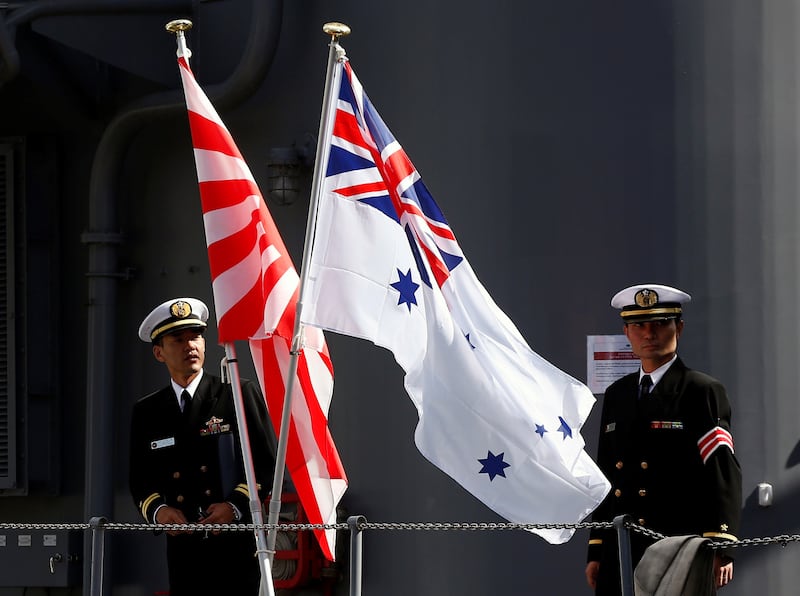Leaders of Australia and Japan signed a new agreement at a virtual summit Thursday that paves the way for future defense cooperation between the two countries – a move analysts view as a response to a rising China.
Experts familiar with the negotiations said it would allow Canberra and Tokyo to expand practical military cooperation including access to each other’s military facilities, secure port access, landing rights, logistic support, security arrangements and legal regimes.
Prime Minister Scott Morrison and his Japanese counterpart, Fumio Kishida, "signed the landmark Reciprocal Access Agreement between Australia and Japan (Australia-Japan RAA), underscoring their commitment to further elevating bilateral security and defense cooperation in the interests of peace and stability in the Indo-Pacific region," said a joint statement issued after Thursday's summit.
The two leaders would “pursue the completion of respective domestic procedures necessary to give effect to the Australia-Japan RAA as early as possible.”
It will be followed by a new Joint Declaration on Security Cooperation at a later date to provide more detailed guidelines for the future cooperation.
The new agreement will facilitate joint military activities and exercises “including those of greater scale and complexity, while improving the interoperability and capability of the two countries’ forces,” the statement said.
Australia and Japan have been negotiating the RAA since 2014 and only reached a basic agreement on it in 2020.
The pact is the first of its kind that Japan has struck with another country, made possible since Tokyo moved away from the constraints of Japan’s post-war constitution, which outlawed war as a means to settle international disputes.
‘A rising China’
Prime Minister Morrison described the new pact as a “pivotal moment for Australia and Japan and (for) the security of our two nations and our people” amid China’s increasing assertiveness and military expansion.
Malcolm Davis, a senior analyst at the Australian Strategic Policy Institute, said: “It really is about a rising China.”
“It sends an important message to Beijing that Australia and Japan are now working much more closely together to shape the regional environment, deter threats and respond to those threats if necessary,” he said.
Seijiro Takeshita, a professor at the University of Shizuoka in Japan, said that under the threats of China’s aggression, “we need all the help we could get.”
“More coalition and more strong ties, especially in this region, is a necessity,” he said.

Most of the joint statement focuses on security and defense cooperation in the Indo-Pacific and beyond, with a confirmation that “Australia and Japan will play a significant role in realizing a free and open Indo-Pacific.”
On the situation in the South China Sea, the two leaders shared “serious concerns” and “underlined the importance of being able to exercise rights and freedoms consistent with the United Nations Convention on the Law of the Sea (UNCLOS).”
“They reaffirmed their strong objection to China's unlawful maritime claims and activities that are inconsistent with UNCLOS,” the statement said, adding that “the 2016 South China Sea Arbitral Tribunal decision is final and legally binding on the parties to the dispute.”
“They strongly opposed any unilateral attempts to change the status quo by force.”
Many points of the new agreement echo what was engraved in the AUKUS defense pact that Australia signed last year with the United Kingdom and the United States, but which Beijing strongly criticized.
It also builds on efforts by the U.S., Japan, India and Australia – dubbed the Quad – to work on shared concerns about China.
But unlike the Quad – “a four-way coalition that is geographically and economically dispersed” – one-on-one cooperation deals would be helpful for Japan in the region, said Takeshita from the University of Shizuoka.
Just before the two prime ministers met, a Chinese government spokesman said that any agreements between countries should promote regional peace.
Wang Wenbin, the spokesman for China’s foreign ministry, warned that “state-to-state exchanges and cooperation should be conducive to enhancing mutual understanding and trust among countries in the region and safeguarding regional peace and stability, rather than targeting or undermining the interests of any third party.”
“We hope that the Pacific will be an ocean of peace, not a place to make waves,” Wang told reporters in Beijing.
